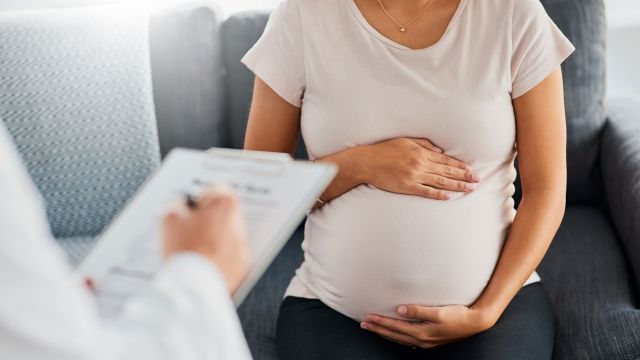Women have a slightly increased breast cancer risk in the years after they give birth, say researchers who analyzed information from hundreds of thousands of women around the world. The small risk increase peaks at about 5 years after a woman’s last delivery, the team reported December 11, 2018, in the Annals of Internal Medicine.
Doesn’t childbirth protect against breast cancer?
If this finding sounds a little different from what you’ve heard about pregnancy and breast cancer risk, you’re not alone. “What most people know is that women who have children tend to have lower breast cancer risk than women who have not had children,” study author Hazel B. Nichols, PhD, assistant professor of epidemiology at the Gillings School of Global Public Health at UNC in Chapel Hill, North Carolina, said in a statement.
That’s still true, but it applies to women who are older, decades past their last childbirth experience. “Before that,” said Nichols about the latest findings, “breast cancer risk was higher in women who had recently had a child.”
Is having a baby now a risk factor?
With these new revelations, it’s important to remember that breast cancer is uncommon in women of reproductive age. “The risk of developing breast cancer is still low overall, even if you’ve had a child five years ago,” Nichols noted.
According to the study findings, 3 in 100 women between the ages of 41 and 50 years will develop breast cancer. That number bumps up slightly to 3.1 of every 100 women in this age group who have given birth in the last 3 to 7 years.
Reports of a possible link between a recent childbirth and increased breast cancer risk have popped up before. But Nichols and her colleagues gathered information from 15 well-designed studies that included a total of 889,944 women. This huge pile of data allowed them to consider how other factors added to the mix, such as a family history of breast cancer or breastfeeding.
The researchers found that breast cancer risk peaks about 5 years after childbirth, cresting earlier for women who have more births. The risk then steadily fades over a couple of decades. Eventually, childbirth becomes linked to decreased instead of increased breast cancer risk, somewhere between 14.8 and 25 years after the last delivery.
Age at delivery also plays a role. Risk increases for women over age 25 at their first childbirth, going up gradually with age. For women ages 25 to 39 having their first delivery, cancer risk peaks from 4.6 to 6.4 years after childbirth. Women under age 25 seem to have no increased risk.
Risk for childbearing age women remains small
The absolute numbers of breast cancer diagnoses remain relatively small: compared to women who had never given birth, for every 100,000 women age 41 to 45 who delivered within the last 3 to 7 years, there were an added 41 cases of breast cancer.
It’s worth noting that the eventual protection against breast cancer that childbirth offers applies only to the type that depends on the hormone estrogen. And perhaps surprisingly, the authors reported that breastfeeding does not dampen the years-long risk increase.
How childbearing might affect breast cancer
These findings do not explain exactly how any of these factors—age at first delivery, time since delivery, number of deliveries—promote or protect against breast cancer. The study authors said that one possible explanation is a burst in breast cell growth that occurs during pregnancy, which may push some cells with cancerous tendencies further toward disease.
Do the findings change current practices?
The authors emphasize that the important takeaway from their findings is that women and their healthcare providers should be alert in the years following childbirth to this slight increase in risk. “We want women and their doctors not to assume that recently having a child is always protective for breast cancer,” Nichols said.
In an editorial accompanying the study, Katrina Armstrong, MD, of Massachusetts General Hospital in Boston, notes that most breast cancer doesn’t strike until women are in their 50s or older and that childbirth becomes protective for most women by this age. This protection during higher-risk ages is probably more important than the transient risk increase at younger ages when risk is already quite low, says Armstrong. In general, she says, women do not need to deviate from current practices for screening, diagnosing and preventing breast cancer.
That means all women should follow a healthy lifestyle—including eating healthfully, exercising and limiting alcohol consumption—to reduce breast cancer risk as much as possible. It also means consulting with a doctor right away if a woman detects anything abnormal in her breasts.
This research may not change official breast cancer screening guidelines, but most recommendations allow some flexibility for women to decide with their doctors when to begin. The new findings lend credence to the notion that information about childbirth may be a valuable piece of information women and their doctors can factor in—along with all other risk factors—when deciding what screening schedule makes the most sense for each individual.





